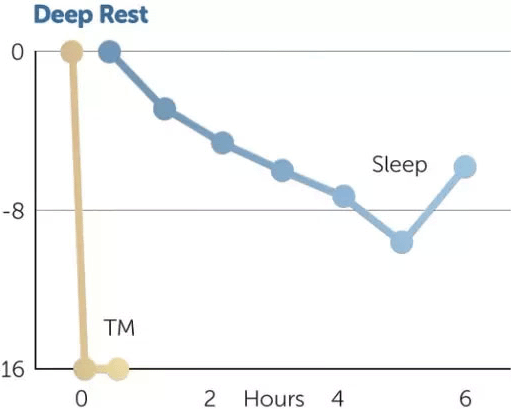Reduced Fatigue
“Nurse fatigue” is a condition of persistent tiredness or exhaustion, making it difficult to perform tasks. Nurses are routinely scheduled to work 12-hour shifts. Fatigue arising from excessive work demands is a known safety challenge in hospital nurses.
The human physiology is also vulnerable to fatigue from other causes such as anemia, thyroid imbalance, inadequate sleep, insufficient exercise and nutritional deficiency. A prevalent cause of fatigue for nurses is prolonged stress.

Research verifying relevant benefits of the TM technique include:
- Deep rest (American Psychologist)
- 42% decrease in insomnia (Journal of Counseling and Development)
- Greater resistance to stress (Psychosomatic Medicine)
- 33% decrease in anxiety (Journal of Alternative and Complementary Medicine)
Adrenal fatigue also causes tiredness. Research published in Psychoneuroendocrinology indicated that the TM technique reduces baseline cortisol levels so that adrenal glands are not overtaxed when not under extreme stress.
Peer-reviewed research reported in the Journal of Neural Transmission, Physiology & Behavior and the Journal of Alternative and Complementary Medicine revealed that individuals practicing the TM technique had 30-40% lower levels of all three major stress hormones–decreasing the risk of chronic fatigue and exhaustion.
Learning Transcendental Meditation is a very effective, scientifically verified way of both preventing and reducing stress and fatigue.
“TM practice is effortless, and unlike other meditation practices I have tried. TM has given me a calmness and a centeredness. Since beginning TM practice I have felt better rested and focused. I view my practice as a much needed and beneficial form of self-care that then extends to better outcomes in both my personal and professional life. I have more creative energy than previously, more patience and more joy.”
Amy Sannes RN BSN
Dr. Nancy Lonsdorf, graduate of Stanford University and Johns Hopkins School of Medicine is a nationally renowned author on health issues. She writes:
“When we’re tired, we don’t think as clearly, are more distractible, and take longer to complete our tasks. We also may stay up too late trying to finish off what didn’t get done during the day. This ends up creating a vicious cycle of fatigue, lack of rest, too much activity, and more fatigue. Taking the TM course is the number one recommendation I make to all my patients.”
